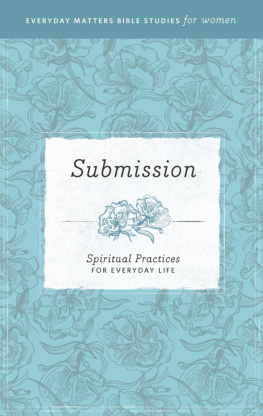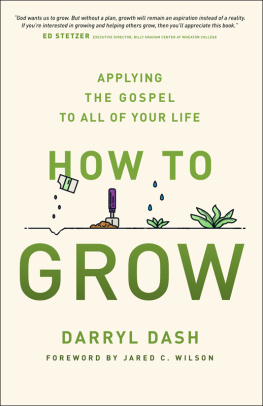Table of Contents
Landmarks
When my husband and I were in our early twenties, we decided to run a half marathon. It seemed reasonable to us that two couch potatoes could become runners during the twelve weeks of training, but that was an assumption built on the idea that we would actually complete all of the training. In truth, we completed less than half of it. (What can I say? It was 2006, and we had just discovered Netflix.) The race was a disaster. We dealt with muscle cramps, knee pain, low blood sugar, stomach problems, and more. My toes were bleeding by the time we limped across the finish line, and my husband promised he would never agree to such madness again.
Runners run . They dont hope one day theyll wake up and feel like running. They run when they feel like it, and more importantly, when they dont. Anything we want to learn and grow in doesnt happen in one big decision but in thousands of little ones. I could have been a marathon runner if Id made the everyday decisions to run and train on all the days between sign-up day and race day. It wasnt enough to sign up for the race and hope Id eventually drift toward athleticism.
We have similar expectations about our spiritual health sometimes, dont we? Ive found it to be a common sentiment among harried, busy Christians that the next season of life will find them more disciplined, more faithful, more devoted to Christ simply because theyll be older and wiser with the passage of time. If only they can just get through these next few hectic years on a string of emergency prayers and a smattering of verse-of-the-day emails! Ive had those expectations, and Ill be the first to tell you it simply doesnt work that way. Stumbling across the finish line with bloody feet taught me the value of daily investment for a desired outcome. Our perseverance in spiritual growth requires daily decisions of investment, and the good news is that God has given us everything we need.
In this chapter, well discuss the gifts of Scripture, prayer, and the church as the God-ordained means for nourishing our souls. Well learn to distinguish legalism from laziness and why neither should keep us from drawing near to the Lord each day. Well look at some practical ways to employ the gifts God has given us for holding fast to the gospel for those of usincluding me!who struggle to implement the vital practice of spiritual disciplines.
Everything We Need for Life and Godliness
Knowing that God has promised to complete the work he began in us, we are well equipped to practice perseverance, as Peter explains in his second epistle:
His divine power has granted to us all things that pertain to life and godliness, through the knowledge of him, who called us to his own glory and excellence, by which he has granted to us his precious and very great promises, so that through them you may become partakers of the divine nature, having escaped from the corruption that is in the world because of sinful desire. For this very reason, make every effort to supplement your faith with virtue, and virtue with knowledge, and knowledge with self-control, and self-control with steadfastness, and steadfastness with godliness, and godliness with brotherly affection, and brotherly affection with love. (2 Pet. 1:37 )
Because God has given us his precious and very great promises, Peter encourages believers to supplement faith with godliness, knowledge, steadfastness, and self-controlall of which have a direct impact on our relationships with other believers. He underscores his exhortation with a warning:
For if these qualities are yours and are increasing, they keep you from being ineffective or unfruitful in the knowledge of our Lord Jesus Christ. For whoever lacks these qualities is so nearsighted that he is blind, having forgotten that he was cleansed from his former sins. Therefore, brothers, be all the more diligent to confirm your calling and election, for if you practice these qualities you will never fall. For in this way there will be richly provided for you an entrance into the eternal kingdom of our Lord and Savior Jesus Christ. (2 Pet. 1:811 )
long-term patterns of neglect should give us pause about our spiritual condition. If we spend much of our lives resistant to pursuing godliness in the ways God has given us, then we might be deceiving ourselves as to whether we have been cleansed from our sins through Christ. If we have been cleansed, then we should long to become like the one who did the cleansing! The power of God within us aids us in our endeavors to grow in godliness, and through the habits of grace we can supplement our faith, building it up with effectiveness and fruitfulness.
With the help and investment of God, the path to spiritual maturity and growth begins and travels through the pages of Scripture and prayer, both individually and within the community of faith. The apostle Paul said that every word of Scripture is breathed out by God, divinely inspired by him and without error. His word is wisdom unto salvation, and after that, for sanctification (see 2 Tim. 3:16). To follow Jesus on day one, look to him in the word. To follow Jesus on day 9,412, look to him in the word. The words of the Lord are for both our salvation and our sanctification.
And Paul tells us godliness comes by being trained in Gods word:
If you put these [teachings] before the brothers, you will be a good servant of Christ Jesus , being trained in the words of the faith and of the good doctrine that you have followed. Have nothing to do with irreverent, silly myths. Rather train yourself for godliness; for while bodily training is of some value, godliness is of value in every way, as it holds promise for the present life and also for the life to come. (1 Tim. 4:68 )
Do you see how faithfulness is tied to godliness? And how godliness is tied to Gods word? Being trained by the words and good doctrine of the Lord requires being rooted in those words and doctrine. The resulting benefits arent just for this life but for the one to come. Discipline for the purpose of godliness keeps us faithful on all the days between the first day of following Christ and the day we see him face-to-face, ensuring us that we will see him face-to-face. Those are very long-term benefits! Christs finished work on the cross is sure, but our perseverance in knowing God through his word and prayer reveals and refines our genuine faith.
Jesus Gives Us Access
Throughout this book, well return to the habits of Bible reading, prayer, and corporate worship as the gifts God has given us to remain faithful to him. These spiritual disciplines help to keep us on the path of spiritual maturity, of growth in Christ, of looking more and more like him every day. God ordained that the path of sanctification be paved with Scripture and prayer, and we must submit ourselves to his plan for our spiritual maturity. The writer of Hebrews encourages us to hold fast to the access weve been given to God through Jesus at the cross:
Therefore, brothers, since we have confidence to enter the holy places by the blood of Jesus , by the new and living way that he opened for us through the curtain, that is, through his flesh, and since we have a great priest over the house of God, let us draw near with a true heart in full assurance of faith, with our hearts sprinkled clean from an evil conscience and our bodies washed with pure water. Let us hold fast the confession of our hope without wavering, for he who promised is faithful. And let us consider how to stir up one another to love and good works, not neglecting to meet together, as is the habit of some, but encouraging one another, and all the more as you see the Day drawing near. (Heb. 10:1925 )
In light of this amazing free access to the Father, were charged to do three things: (1) draw near, (2) hold fast to the confession, and (3) stir up fellow believers to love and good deeds. We can obey through our individual and corporate spiritual disciplines.














